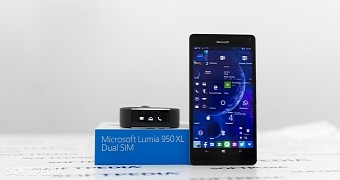Long-time Windows phone users are certainly aware that one of the most criticized aspects of Microsoft’s smartphone platform was the lack of apps, mostly because some very popular apps, such as Google’s, were (and still are) missing.
Microsoft pushed hard for universal apps in an attempt to address this lack of apps, but at some level, the issue still persists.
Universal apps are developed to work on all Windows 10 devices, and Windows phones were supposed to benefit from developers’ appetite for targeting a growing audience available on the PC. But it doesn’t even matter if this thing worked or not because Windows phones have a completely different problem now.
The lack of apps is a more subjective issue, or personal problem with the platform if you wish, because there are lots of users out there who are just fine without apps. And this is mostly because Windows Phone and Windows 10 Mobile already come with the essential apps integrated into the system, while the top third-party apps are already on the platform, either with official apps or third-party clients.
But there is something that’s not influenced by personal preferences: the quality of apps. In the last few months, I’ve noticed a degrading quality of Windows 10 Mobile apps and it’s all happening because developers barely release updates for Windows phones.
The Facebook nightmare
Without a doubt, the best example is the Facebook app. Launched with much fanfare on Windows 10 Mobile, the official Facebook app is more of a fiasco for many Windows phone users because of bugs that have been there for ever and which the company doesn’t seem to be too interested in.
The Facebook app is painfully slow on Windows 10 Mobile, and you can notice this if you’re actually lucky enough to get it work. There are exceptions, that’s true, and there will always be someone saying everything works fine in their case, but judging from the number of complaints pointed online, the Facebook app is a nightmare and nothing more.
Let’s look at the reviews posted in the Windows Store for a couple of minutes. Facebook has an overall rating of 3.7 out of a maximum of 5, and there are nearly 22,000 1-star ratings (there are also 58,000 5-star ratings too, but keep in mind that this client is universal, so reviews can also be posted by PC users). Reviews pretty much speak for themselves:
“This app is very slow, especially launching. It is difficult to make comments because screens don't size properly and you can't navigate to other windows without loosing video/audio stream,” one user says, while another one adds that “the app bogs everything down.” One angry user who rated the app with one star says it keeps crashing and “it takes at least 3 times to get the app to open up.”
Bugs are OK
And Facebook is not the only example. The official Messenger app, which is developed by the same company, experiences similar issues, and so does Instagram, which crashes every once in a while and proves to be rather slow at certain times.
Bugs can be found in many other apps, and that’s perfectly fine as long as developers fix them. But that no longer seems to happen, so even if you wish to ignore the lack of apps and continue living with Windows phones, there’s this problem that ruins everything.
There’s a workaround for the poor quality of apps too, though. And it all comes down to the browser. Most services, including Facebook, can be very well accessed through your browser, and in some cases, such as Amazon, there’s not even a big difference. There are Windows Phone apps which are nothing more than web wrappers, so you should be fine with the browser version anyway.
But in the end, this all adds up to other frustrations that users are experiencing with the platform and certainly makes some of them consider switching to Android and iOS.
Is this what Microsoft wants its users to do? Undoubtedly not, but with the company not saying a single thing about mobile, the answer to this question could be anything.

 14 DAY TRIAL //
14 DAY TRIAL //